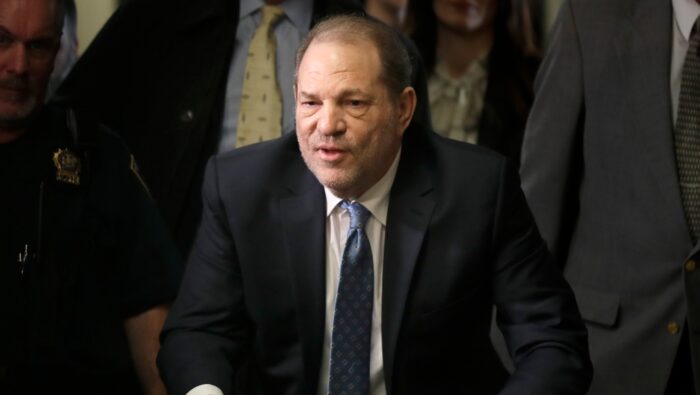Disgraced Hollywood producer Harvey Weinstein had his 2020 rape and sexual assault convictions stunningly overturned by a New York appeals. Weinstein was originally sentenced to 23 years in prison for raping actress Jessica Mann in 2013 and forcibly performing oral sex on production assistant Mimi Haleyi in 2006. In this article we talk about: Weinstein Walks Free-You Won’t Believe Why His Rape Conviction Was Tossed?
The appeals ruling shocked many, given the sheer volume of sexual assault and harassment allegations made against Weinstein by over 80 women. However, the decision provides critical legal analysis into how Weinstein secured his freedom despite being a convicted rapist.
Why Was The Conviction Overturned?
In their written opinion, the appeals court took issue with Judge James Burke allowing additional witnesses to testify to uncharged allegations, calling it “unfairly prejudicial”.
Specifically, the court found that Judge Burke enabled prosecutors to present witnesses accusing Weinstein of abuse, even if their claims did not directly relate to the actual charges. These witnesses included actresses Annabella Sciorra, Tarale Wulff, Dawn Dunning and Lauren Young.
The opinion states that while their testimony was meant to demonstrate Weinstein’s “propensity for committing sexual assault”, allowing additional witnesses to describe other “bad acts” unfairly swayed the jury. The court argued that even if the women’s testimony was truthful, the “volume” of allegations from “seemingly authoritative” sources denied Weinstein the “fair trial” he was owed.
Ultimately, the court decided Judge Burke’s failure to adequately balance the “probative value” of additional witnesses with the “prejudicial effects” provided grounds to overturn Weinstein’s conviction and order a new trial.
What Was The Dissenting Opinion?
Three judges dissented, arguing that existing legal precedents allowed for witness testimony to demonstrate Weinstein’s “intent, common scheme and plan”. They found the additional witnesses properly showed Weinstein’s “lifelong pattern of abusive behavior toward women”.
Dissenting Judge Madeline Singas wrote that the decision “has continued a disturbing trend of overturning juries’ guilty verdicts in cases involving sexual violence”. She argued it displays a “fundamental misunderstanding” of how power dynamics allow influential men to perpetrate abuse.
The dissent holds that while the trial was undoubtedly imperfect, it did not meet the high bar of “egregious unfairness” required to overturn a jury conviction.
What Was The Response?
Advocates for sexual assault survivors strongly condemned the ruling. Actress Ashley Judd, one of Weinstein’s first public accusers, said it demonstrates “what it’s like to be a woman in America, living with male entitlement to our bodies”.
Manhattan District Attorney Alvin Bragg, who inherited the case from predecessor Cyrus Vance Jr., said his office is committed to retrying Weinstein. But a new trial raises the possibility of forcing Weinstein’s victims to emotionally relive abuse they suffered years prior.
On the other hand, Weinstein’s attorney Arthur Aidala praised the decision, saying “the law applies to everyone”. Weinstein himself remains incarcerated, but in a New York facility pending potential retrial, rather than serving his sentence in California as originally intended.
What Does This Mean For #MeToo Cases?
The Weinstein appeal ruling may make prosecutors reluctant to pursue complex #MeToo-related cases involving powerful defendants. District attorneys must now reassess how to introduce witnesses offering supporting testimony without denying defendants fair trials.
For victim advocates, this is seen as a massive setback after Weinstein’s landmark conviction in 2020 signaled the legal system taking workplace sexual abuse seriously. But the appeals court centered technical flaws in Judge Burke’s decision-making rather than the credibility of victims.
Nonetheless, the overturned conviction is likely to deter some victims from coming forward if they feel the system cannot deliver justice even in extensively documented cases. Prosecutors must now carefully assess how to balance achieving righteous convictions with adhering to exacting appeals standards.
The Road Ahead For Weinstein
Harvey Weinstein is not walking free yet. With Los Angeles prosecutors successfully convicting him in December 2021 for rape and assault, he faces 16 years in California prison.
While Weinstein secured a major appeal victory in New York, he remains a convicted felon in California. However, with Weinstein in declining health at age 70, further imprisonment may prove academic if he does not live long enough to face retrial in New York.
The appeals decision shocked the world given Weinstein’s status as the catalyst behind the #MeToo movement. But the detailed legal analysis explaining why his conviction was tossed provides invaluable insight into how future proceedings must account for defendants’ rights, no matter how abhorrent the alleged crimes may be.
Ultimately, American justice strives for fair trials, not predetermined outcomes. The appeal ruling reiterates how critical adhering to exacting legal standards is for securing trust in the system itself. Even the most reviled members of society must receive objective due process absent emotions or preconceived judgments.
Whether one supports the decision or not, it compels prosecutors to pursue ironclad cases leaving no question that convictions resulted from judicious analysis of laws designed to balance society’s desire for both justice and impartiality. I sincerely hope you find this “Weinstein Walks Free-You Won’t Believe Why His Rape Conviction Was Tossed?” article helpful.

We are thrilled to feature Dory Larrabee Zayas, a NYC-based beauty, fashion, and parenting writer with a keen eye for celebrity news and biography journalism. Dory’s insightful contributions appear in renowned publications such as Allure, Well+Good, Forbes, and RealSelf. Known for her fresh perspective on midsize fashion, beauty trends, and parenting, she brings a wealth of expertise and diverse viewpoints to CelebrityPlus.net.
Follow Dory’s latest updates and engaging content on Instagram:
- Instagram: @doryzayas
- Followers: 4,792
- Following: 1,828
- Posts: 2,446
Explore Dory’s in-depth features and cultural insights that celebrate the rich backgrounds and unique experiences of celebrities.





